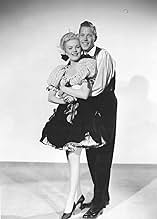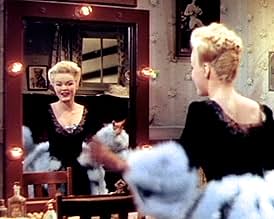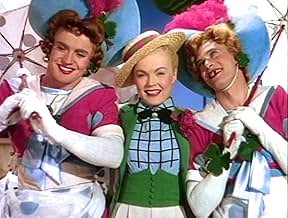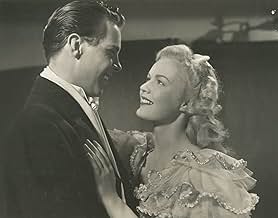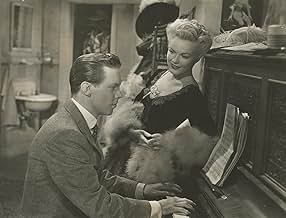CALIFICACIÓN DE IMDb
6.0/10
215
TU CALIFICACIÓN
Agrega una trama en tu idiomaA tuneful account of the life of Ernest R. Ball, composer of many popular Irish songs, including "When Irish Eyes Are Smiling".A tuneful account of the life of Ernest R. Ball, composer of many popular Irish songs, including "When Irish Eyes Are Smiling".A tuneful account of the life of Ernest R. Ball, composer of many popular Irish songs, including "When Irish Eyes Are Smiling".
- Dirección
- Guionistas
- Elenco
- Nominado a 1 premio Óscar
- 1 premio ganado y 1 nominación en total
Leo Mostovoy
- Pawnbroker
- (escenas eliminadas)
Ray Walker
- Hoofer
- (escenas eliminadas)
Eddie Acuff
- Harry
- (sin créditos)
Lester Allen
- Heming
- (sin créditos)
Gurney Bell
- Member of Sportsmen's Quartette
- (sin créditos)
Herman Belmonte
- Chorus Boy
- (sin créditos)
William H. Benter
- Minor Role
- (sin créditos)
Billy Bester
- Minor Role
- (sin créditos)
- Dirección
- Guionistas
- Todo el elenco y el equipo
- Producción, taquilla y más en IMDbPro
Opiniones destacadas
The film is part of a long line of musical biographies of songwriters that has hardly any interest in the person's actual life story. Instead, calling them biographies allows the musicals to cull songs from their catalog for various musical numbers. Still, at times, these films can be pleasant time-wasters. This one, ostensibly about turn-of-the-century songwriter Ernest Ball, is one of these pleasant but unexceptional entries.
Judging from the songs presented in the film, Ball specialized in Irish hokum ("Mother Macree" for example)--lugubrious ballads that wallowed in maternal sentimentality and dreams. Consequently, Dick Haymes portrayal of Ball presents him as a weak passive sort, who is easily pushed around. Seemingly to balance him, June Haver as his romantic interest is incredibly butch--growling, aggressive, and constantly popping people in the eye. While Haymes sings Ball's slow ballads, Haver performs peppy up-tempo numbers (that were not written by Ball). One of these underlines the reversal of gender-expected behavior: "Bessie in a Bustle." Here, Haver sings in male clothing, as various men in drag (with bustles naturally) cavort around her!
It's a pretty out-of-nowhere moment, but seems to fit the general attitude about aggressive women and passive men that's going on in the rest of the film.
Overall, it's a colorful period piece, with plenty to keep a viewer diverted for an hour and a half--and some interesting ideas if you stop to notice them. But it's no landmark musical.
Judging from the songs presented in the film, Ball specialized in Irish hokum ("Mother Macree" for example)--lugubrious ballads that wallowed in maternal sentimentality and dreams. Consequently, Dick Haymes portrayal of Ball presents him as a weak passive sort, who is easily pushed around. Seemingly to balance him, June Haver as his romantic interest is incredibly butch--growling, aggressive, and constantly popping people in the eye. While Haymes sings Ball's slow ballads, Haver performs peppy up-tempo numbers (that were not written by Ball). One of these underlines the reversal of gender-expected behavior: "Bessie in a Bustle." Here, Haver sings in male clothing, as various men in drag (with bustles naturally) cavort around her!
It's a pretty out-of-nowhere moment, but seems to fit the general attitude about aggressive women and passive men that's going on in the rest of the film.
Overall, it's a colorful period piece, with plenty to keep a viewer diverted for an hour and a half--and some interesting ideas if you stop to notice them. But it's no landmark musical.
Ernest Ball, an aspiring composer from Cleveland, struggled through his younger years to make it in the business. After not being able to make it in his home town, Mr. Ball decides to go East to New York, the capital of the world of entertainment where his music was appreciated and went to have the recognition he deserved.
"Irish Eyes Are Smiling", the biographic film didn't make a good impression of the man and his life. In fact, this was a rather uninspired production of Twentieth Century Fox that must have been created for Dick Haymes, the actor with a golden voice who was at his prime. Directed by veteran actor/director Gregory Ratoff, this is a dull movie where some of Ernest Ball's songs are prominently placed in a musical comedy that didn't do anything to please audiences.
Mr. Haymes had a pleasing tenor voice, but as far as the acting department went, he was at a disadvantage playing opposite Monty Wooley, or even a young Anthony Quinn. This was June Haver's second appearance in a film after her success in "Home in Indiana". She doesn't have much to do as the main interest of Ernest Ball.
The best of Mr. Ball's songs, "When Irish Eyes Are Smiling", which he composed with lyrics by Chauncey Olcott and George Graff proved to be a song that survived the author as it became a standard hymn always associated with Irish celebrations and a must for St. Patrick's Day.
"Irish Eyes Are Smiling", the biographic film didn't make a good impression of the man and his life. In fact, this was a rather uninspired production of Twentieth Century Fox that must have been created for Dick Haymes, the actor with a golden voice who was at his prime. Directed by veteran actor/director Gregory Ratoff, this is a dull movie where some of Ernest Ball's songs are prominently placed in a musical comedy that didn't do anything to please audiences.
Mr. Haymes had a pleasing tenor voice, but as far as the acting department went, he was at a disadvantage playing opposite Monty Wooley, or even a young Anthony Quinn. This was June Haver's second appearance in a film after her success in "Home in Indiana". She doesn't have much to do as the main interest of Ernest Ball.
The best of Mr. Ball's songs, "When Irish Eyes Are Smiling", which he composed with lyrics by Chauncey Olcott and George Graff proved to be a song that survived the author as it became a standard hymn always associated with Irish celebrations and a must for St. Patrick's Day.
Yet another musical biography of a famous songwriter. I saw "Irish Eyes are Smiling" only for the music and the beautiful June Haver but I didn't think it would turn out to be this dull and exhausting. "Irish Eyes" is one of the most laughably boring biographies ever made.
It is the same reaction I had with Haver's later musical, "I Wonder Who's Kissing Her Now"(1947): the Technicolor, the lavish sets and musical numbers are not without merit but the story is frustratingly hollow. It lacks strength and a sense of direction.
It is the same reaction I had with Haver's later musical, "I Wonder Who's Kissing Her Now"(1947): the Technicolor, the lavish sets and musical numbers are not without merit but the story is frustratingly hollow. It lacks strength and a sense of direction.
Most musicals have flaws and this is no exception.Whoever wrote the script should have checked for some sort of continuity but what passes as a story concerns Ameican Irish songwriter Ernest Ball who specializes in songs with an Irish theme,many of which are still heard today.When he shows one to a guy who's about to employ him as a songplugger said guy tells him its junk.He wants him to plug a song which sounds as if he wrote it in his sleep.Ball plays the song at the music hall and the audience more or less start booing.So he plays the one he offered the plugger -When Irish eyes are smiling-and the audience goes wild.He then just gets bigger. Meanwhile June Haver,who he'd tried once to get off with turns up as a Hatcheck Girl having failed to cut it as a chorus girl.A con man Ball hooked up with claims he can make the next woman who enters the room a star.Here it seems obvious that Ball will engineer her appearance. This is where any sense leaves permanently as he doesn't even offer. Instead Miss Haver leaves having sussed out she was the subject of a bet. Meanwhile the con man,in an attempt to lure her back-though its not him has the hots for her-somehow manages to stage a musical of his own and pass off Ball's songs as his own work.Ball sees it via a copy of Variety and heads back to town guns blazing as he thinks its really Miss Haver at work.Meanwhile she's South America bound then changes her mind and comes back to New York. Ball turns up copy of Variety in hand and you think he may at least punch somebody.But no everything ends happily ever after (or because the budget ran out).So the ploy cooked up by the con man was a waste of time.In a real World there would at least be questions asked and threats of copyright infringement Don't look for sense enjoy the songs as they are excellent
This biography of Ernest Ball has numerous historical inaccuracies but none are serious enough to detract from the music. Dick Haymes was a popular singer in the 1940s and appeared in several movies without ever achieving movie-star status. June Haver is beautiful and has several good numbers. Monty Woolley is very good in a semi-comedic role and Anthony Quinn makes a good foil for him. The story tends to drag in spots, but there is enough good music to make watching worth while. The songs include "Boy Of Mine", "Bessie With The Bustle" and (of course) "When Irish Eyes Are Smiling". Watch it for the music and don't worry all that much about the story.
¿Sabías que…?
- Trivia"Lux Radio Theater" broadcast a 60 minute radio adaptation of the movie on March 15, 1948 with Dick Haynes reprising his film role.
- ErroresIn playing the piano while singing "Boy of Mine", you can see a wedding ring on Dick Haymes' hand. He was married to Joanne Dru at the time the movie was being filmed.
- Citas
Belle La Tour: [to Mary] What are you doing in my $85 feathered robe? Take it off!
- Bandas sonorasBessie in a Bustle
(uncredited)
Music by James V. Monaco
Lyrics by Mack Gordon
Copyright 1944 by Bregman, Vocco & Conn, Inc.
Performed by June Haver, unidentified singer and chorus
Selecciones populares
Inicia sesión para calificar y agrega a la lista de videos para obtener recomendaciones personalizadas
Detalles
- Tiempo de ejecución1 hora 30 minutos
- Relación de aspecto
- 1.37 : 1
Contribuir a esta página
Sugiere una edición o agrega el contenido que falta


